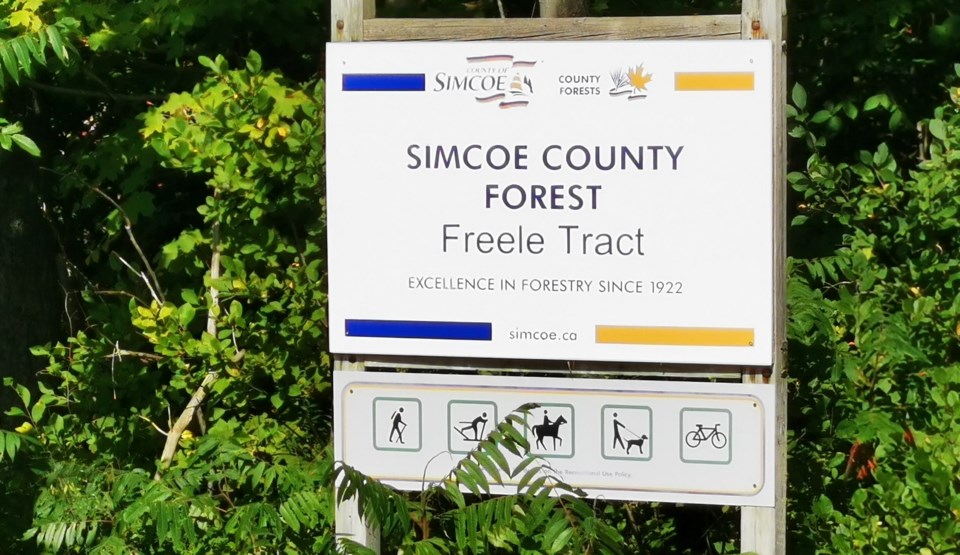Editor's note: The following story has been updated from its original version to clarify the original costs associated with the project. CollingwoodToday apologizes for any confusion.
It's been years since Simcoe County started talking about the need to build an Environmental Resource Recovery Centre (ERCC).
Originally proposed in 2010 as part of the county's waste-management strategy, the ERRC waste-processing project was in a multi-year holding pattern while it made its way through the Ontario Land Tribunal (OLT) process starting in 2019.
At the heart of the OLT challenge was the ERRC’s proposed location — in the Freele Tract of the Simcoe County Forest at 2976 Horseshoe Valley Rd. W., just west of Highway 400 in Springwater Township.
The idea of locating a waste-processing plant in a county forest shocked environmentalists and neighbours. Appeals were launched.
In early 2022, the OLT dismissed appeals against the location. OLT vice-chair Sharyn Vincent said in her ruling she was not convinced the project would cause significant harm to the forest or the wildlife.
The tribunal approved the county’s applications for an amendment to the township's Official Plan and zoning bylaw to make way for the ERRC's development.
At the time, the county was directed to prepare environmental and wildlife management plans prior to site-plan approval. It had to be developed in consultation with the Ministry of Natural Resources and Forestry and the Nottawasaga Valley Conservation Authority.
“Both the environmental management plan and wildlife management plan have been started,” said Rob McCullough, director of solid waste management for Simcoe County. “They are currently both in draft and will be updated to reflect the confirmed site layout, once approved.”
This won’t happen until a county council decision on site specifics is received and a detailed site design is completed, he added.
“There’s many more regulatory hoops to jump through, but as far as zoning for the property is concerned, that’s all been handled,” McCullough said. “Before we start working on the property, we’ve got to get site-plan approval from Springwater Township and we also have to apply to the Ministry of the Environment for a licence to operate that type of facility.
“It takes quite a bit of time to go through that process and there are always challenges, but it’s completely doable," he added.
As with any large infrastructure project, and particularly a waste management project, the siting and property component is often the most complex and timely phase of the project.
County council will receive a public update regarding costs to date, as well as a revised business case in the coming months.
At a county council meeting in October 2020, councillors were told construction of the ERRC site would begin in 2023, with a potential opening of 2026. That was well before the drawn-out OLT process.
When construction starts is anybody’s guess.
“When the shovels go in the ground is entirely up to county council,” McCullough said. “We will give them a development timeline, but many of the things in that timeline rely on things outside of our organization.”
As the project moves forward, costs continue to mount.
The original estimated cost of the materials transfer component of the ERRC was $4.7 million in 2014. It rose to between $14 and $16 million in 2017. The initial estimate for the organics processing component of the ERRC was between $10 and $35 million in 2014. It was estimated at between $16 and $35 million in 2017. The range is due to the varying technology options available.
By the time shovels actually go in the ground, the costs will probably be much higher, based on the increased costs of construction materials over the past two years. Legal fees associated with the OLT process, meanwhile, are estimated to be in the area of $1.5 million.
Additionally, the delays have resulted in lost funding from other levels of government. Grant funding approved in 2014 through the province’s Continuous Improvement Fund (CIF) for $2.2 million was contingent on construction starting by November 2020. The facility had to be operational by the end of 2023.
The county remains hopeful that other grants and funding streams may become available.
Even with the extra investment, McCullough thinks the only way to look at the real cost of the ERRC is to look at the alternatives.
“We’re spending a lot of money hauling the material a long ways away for someone else to process it and turn it into a fertilizer to spread on farm fields that are local to them,” he said.
“What we’re trying to do here is look at an economically viable venture that will do the same thing here, remove some of those transportation costs, and provide a local product for spreading on local farm fields.”


